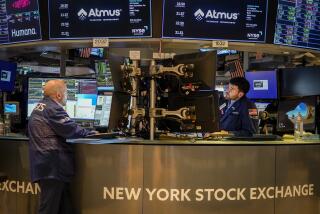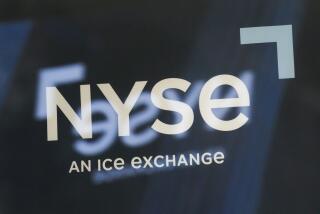Mixed Economic News Weighs Down Stocks
Stocks stumbled Thursday as mixed economic news and further hints of higher interest rates from Federal Reserve Chairman Alan Greenspan kept many buyers at bay. Long-term bond yields rose for a third session.
The Fed chairman, in a second day of testimony before Congress, reiterated that the economy continued to expand at a respectable pace, and that inflation, while not an immediate threat, remained something policymakers must guard against.
He again said interest rates were “fairly low” relative to inflation, which many analysts said was a warning that the central bank would continue to push up short-term rates.
“Greenspan is doing a good job of preparing American investors for what’s ahead: We’re in a period of rising interest rates, and that’s going to continue,” said Thomas F. Lydon Jr., president of Global Trends Investments in Newport Beach.
The Dow Jones industrial average lost 80.62 points, or 0.7%, to 10,754.26, falling back into the red for the year.
Broader gauges also posted declines. The Standard & Poor’s 500 index was down 9.59 points, or 0.8%, to 1,200.75, after rising for five straight sessions. The Nasdaq composite shed 26.09 points, or 1.3%, to 2,061.34.
Decliners outnumbered advancing issues by 2 to 1 on the New York Stock Exchange and on Nasdaq.
Economic reports Thursday didn’t give much encouragement to buyers. Jobless-benefit claims were down for a third straight week, the Labor Department said. But the Conference Board said its index of leading economic indicators fell in January.
In another report, the government said prices for imported goods rose 0.9% in January, fanning concerns about higher import prices because of the dollar’s slide over the last year.
In the bond market, inflation jitters and Greenspan’s comments drove the yield on the benchmark 10-year Treasury note to 4.18%, up from 4.16% on Wednesday. The yield hit a four-month low of 3.98% last week.
The 30-year T-bond ended at 4.57%, up from 4.52% on Wednesday. The 30-year bond yield fell to 4.37% last week, the lowest in more than a year.
In other market highlights:
* Near-term oil futures prices declined 79 cents to settle at $47.54 a barrel in New York as traders weighed OPEC’s forecast of rising global demand against reports of increased U.S. crude inventories.
* The dollar softened against the euro, which rose to $1.308, from $1.303 on Wednesday. Gold rose $1.80 to $427.30 an ounce.
* Financial stocks weakened as interest rates rose. Golden West Financial lost $1.39 to $62.11, Prudential Financial fell 92 cents to $58.12 and Lehman Bros. slid $1.12 to $91.65.
Also in the financial sector, Fannie Mae slumped $1.41 to $60.61 and Freddie Mac dropped $1.99 to $63.90 after Greenspan called on Congress to gradually curtail growth in the mortgage companies’ combined $1.55-trillion loan portfolios, in order to avert possible financial market instability.
* In the retail sector, RadioShack tumbled $3.44 to $29.93 for the biggest drop in the S&P; 500. The company expects profit this year of $2.34 to $2.40 a share, less than the average estimate of $2.41 by analysts in a Thomson First Call survey.
Wal-Mart Stores and Target advanced after reporting better-than-expected quarterly financial results. Wal-Mart added 10 cents to $52.70, and Target gained $1.09 to $50.16.
* Altria Group, the parent of Philip Morris and Kraft Foods, eased 79 cents to $64.72. The Justice Department said it would appeal a ruling that barred the U.S. from seeking $280 billion in past profits from the tobacco industry to the full membership of a federal appeals court.
* The S&P; 600 index of small-company stocks dropped 1.1% to 327.29, and the S&P; 400 index of mid-size shares lost 0.8% to 662.09. Both indexes had hit record closing highs on Wednesday.
More to Read
Inside the business of entertainment
The Wide Shot brings you news, analysis and insights on everything from streaming wars to production — and what it all means for the future.
You may occasionally receive promotional content from the Los Angeles Times.










